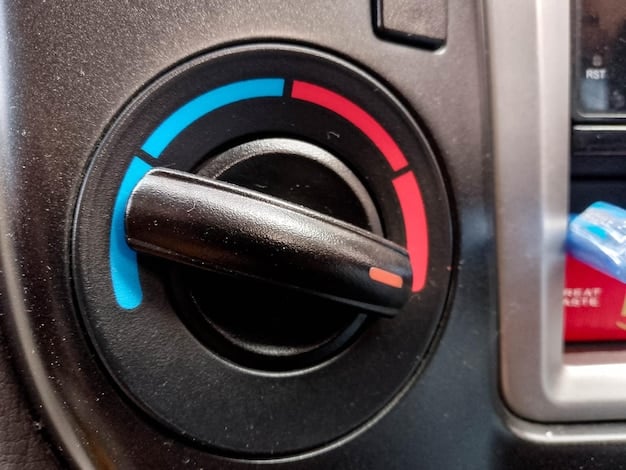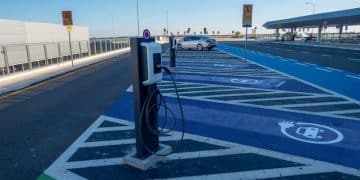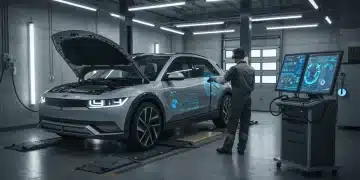Electric Vehicle Battery Health: Expert Tips to Extend Lifespan

Maximize your electric vehicle’s lifespan and resale value by understanding key factors influencing battery health such as driving habits, charging practices, environmental conditions, and smart maintenance strategies.
Electric vehicle owners often worry about battery health, impacting both the car’s performance and its resale value. Understanding how to care for your EV battery can significantly extend its lifespan and maintain its value. This article delves into expert tips to enhance your Electric Vehicle Battery Health: Insider Tips to Extend Lifespan by 20% and Maximize Resale Value.
Understanding EV Battery Chemistry and Its Impact
The foundation of optimal EV battery care lies in understanding the battery’s chemistry. Different battery types, such as Lithium-ion (Li-ion) and Lithium Iron Phosphate (LiFePO4), react differently to charging habits and environmental conditions.
Lithium-ion (Li-ion) Batteries
Li-ion batteries are commonly used in EVs due to their high energy density and relatively long lifespan. However, their performance can degrade over time.
Lithium Iron Phosphate (LiFePO4) Batteries
LiFePO4 batteries offer enhanced thermal stability and longer lifecycles compared to traditional Li-ion. They are becoming increasingly popular in newer EV models.
Understanding these fundamental differences is crucial for tailoring your maintenance and charging strategies to best suit your EV’s specific battery type.

Smart Charging Practices
Charging habits significantly impact your EV battery’s health. Consistent overcharging or deep discharging can accelerate degradation. Implementing smart charging practices helps mitigate these risks.
- Avoid Fully Charging: Regularly charging to 100% can stress the battery. Aim to charge to around 80-90% for daily use.
- Partial Charging: Frequent, partial charges are less stressful than infrequent, full charges.
- Use Timed Charging: Utilize your EV’s timed charging feature to charge during off-peak hours, reducing strain on both the grid and your battery.
- Optimal Charging Speed: Avoid rapid charging (DC fast charging) too frequently as it generates more heat, which can degrade the battery over time.
Adopting these charging habits can extend the lifespan of your EV battery and maintain its efficiency over time.
The Impact of Driving Habits on Battery Health
Your driving style plays a crucial role in determining the health and longevity of your EV battery. Aggressive driving, characterized by rapid acceleration and hard braking, can generate excessive heat and strain on the battery.
Minimize Aggressive Driving
Consistent hard acceleration and sudden braking lead to higher energy consumption and heat generation, accelerating battery degradation.
Maintain Consistent Speeds
Driving at consistent speeds, especially on highways, reduces energy fluctuations and minimizes stress on the battery.
By adopting smoother, more energy-efficient driving techniques, you not only enhance your EV’s range but also contribute significantly to the long-term health of its battery.
Environmental Factors and Battery Performance
Extreme temperatures, both hot and cold, can negatively impact EV battery performance. Managing these environmental factors is essential for maintaining battery health.
- Heat Management: High temperatures can accelerate battery degradation. Park in shaded areas or use garage to keep the vehicle cool.
- Cold Weather Precautions: Cold temperatures reduce battery capacity. Precondition the battery before driving to optimize performance.
- Battery Thermal Management System (BTMS): Utilize your EV’s BTMS to regulate battery temperature, helping to maintain optimal operating conditions.
Effectively managing these environmental factors will help you ensure your EV battery operates efficiently and maintains its health over the long run.

Battery Maintenance and Monitoring
Regular monitoring and proactive maintenance are crucial for maintaining your EV battery’s health. Modern EVs come equipped with sophisticated monitoring systems that provide valuable data.
Utilize Battery Management Systems (BMS)
Your EV’s BMS provides real-time data on battery health, temperature, voltage, and current. Regularly check this data for any anomalies.
Software Updates
Keep your EV’s software updated. Manufacturers often release updates that optimize battery management and improve overall performance.
Professional Inspections
Schedule regular inspections with certified EV technicians. They can perform detailed battery health checks and identify potential issues early on.
By staying proactive and informed, you can identify and address minor issues before they escalate, keeping your EV battery in optimal condition.
Preparing for Resale: Battery Health and Value
When considering reselling your EV, battery health is a key factor in determining its value. Demonstrating diligent battery care can significantly enhance resale appeal. Documenting your charging habits, maintenance records, and any battery health reports can provide potential buyers with confidence.
Battery Health Reports
Provide potential buyers with detailed battery health reports from certified technicians. These reports offer transparency and build trust.
Warranty Information
Clearly present any remaining battery warranty information, as this provides additional assurance to buyers.
Showcase Good Practices
Highlight your consistent adherence to best practices for charging and maintenance. Emphasize steps taken to mitigate environmental impacts, such as garaging to avoid extreme temperatures.
By proactively managing your battery’s health and documenting your efforts, you can optimize your EV’s resale value and attract more buyers.
Long-Term Strategies for Maximizing Battery Lifespan
Extending the lifespan of your EV battery requires a holistic approach that combines mindful driving habits, smart charging practices, and proactive maintenance strategies. Engaging with EV communities and staying informed on the latest technological advancements can also contribute significantly.
- Stay Informed: Keep abreast of the latest EV battery technologies and best practices through industry publications and online forums.
- Engage with EV Communities: Exchange tips and insights with other EV owners to gain valuable, real-world perspectives on battery care.
- Adopt a Holistic Approach: Combine smart charging, mindful driving, and consistent maintenance to maximize battery health and longevity.
By actively participating in the EV community and staying informed, you empower yourself to make the best decisions for your EV battery’s long-term health.
The key to maximizing Electric Vehicle Battery Health: Insider Tips to Extend Lifespan by 20% and Maximize Resale Value requires a holistic approach encompassing smart charging, mindful driving, and proactive maintenance, securing long-term benefits for performance and resale value.
| Key Point | Brief Description |
|---|---|
| ⚡ Smart Charging | Avoid full charges, use timed charging, and minimize fast charging. |
| 🚗 Driving Habits | Minimize aggressive driving and maintain consistent speeds. |
| 🌡️ Environment | Protect from extreme temperatures and use BTMS. |
| 📊 Monitoring | Check BMS data and update software regularly. |
FAQ
▼
Limit DC fast charging to when necessary, as it can generate more heat which degrades the battery faster. Regular Level 2 charging is gentler on the battery.
▼
Aim to keep your EV battery between 20% and 80% for daily use. This range minimizes stress on the battery cells and helps prolong its lifespan.
▼
Cold weather can significantly reduce EV battery range due to decreased chemical reaction rates. Preconditioning the battery can help mitigate this effect.
▼
Yes, documenting regular maintenance, providing battery health reports, and showcasing good charging habits can significantly enhance your EV’s resale value.
▼
A BMS monitors battery health, voltage, temperature, and current, providing crucial data to optimize performance and prevent damage. Regularly checking BMS data is essential.
Conclusion
By adhering to these expert tips and best practices, EV owners can significantly extend their battery lifespan, enhance vehicle performance, and maximize resale value. Prioritizing battery health is not only beneficial for your wallet but also contributes to a more sustainable transportation future.





